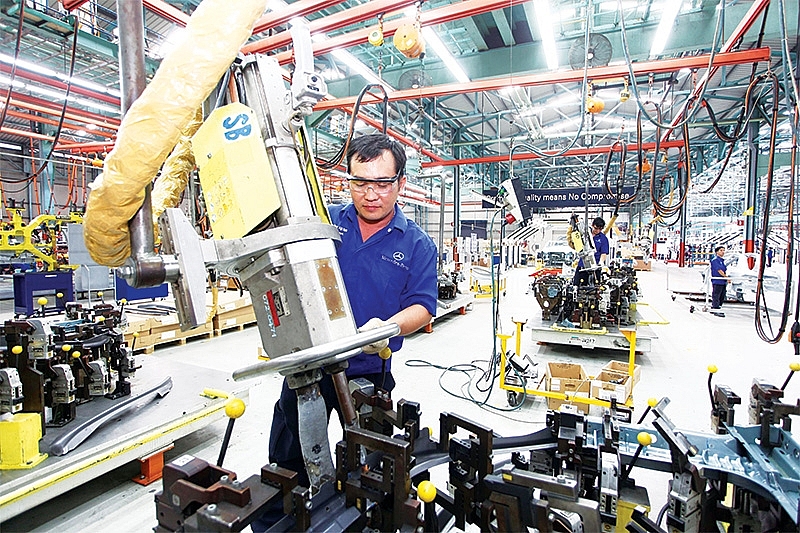EuroCham’s strong support for deal
 |
| Nicolas Audier |
European enterprises and individuals investing in Vietnam want a stable, reliable, and rules-based trade and investment environment. Ever since the first Law on Foreign Investment in 1987, the government has made positive and progressive reforms to its legal framework to make Vietnam a more attractive place for international companies to do business. This has seen foreign direct investment (FDI) becoming the engine of Vietnam’s economic growth over the last three decades, a milestone we were honoured to celebrate along with other international chambers of commerce at the “30 Years of FDI Conference” in Hanoi last May.
Just as FDI was the driving force behind Vietnam’s past economic growth, so it will also be the key to unlocking future trade and investment and assuring Vietnam’s international integration. The EU-Vietnam Investment Protection Agreement (EVIPA) is one of a raft of new-generation free trade agreements, including the EU-Vietnam Free Trade Agreement (EVFTA), which will together help to align Vietnam with international standards and practices, and further integrate into the global economy.
However, unlike the EVFTA, which we hope will be ratified in the European Parliament in the autumn and the Vietnamese National Assembly soon after, the EVIPA will take a little longer to enter into force. That’s because, unlike the EVFTA, it also requires ratification in each EU member state. Simply put, this is because trade is an “exclusive competence” of the European Union, whereas investment protection is a matter for member states. However, together, once ratified and implemented, the EVFTA and EVIPA will attract more new European investment to Vietnam and give investors greater confidence to do business here.
In particular, the EVIPA will achieve this by introducing reformed, modern investment protection rules between Vietnam and the 28 EU member states. These rules will replace the 21 individual, bilateral investment protection agreements in place today. In short, these rules will ensure that European investors will receive the best available treatment, without infringing on Vietnam’s right to legislate in its own best interests on issues such as health and safety or the environment.
 |
| The historic EVIPA and EVFTA are expected to help Vietnam attract more European high-quality investment, Photo: Le Toan |
First and foremost, the EVIPA includes new, more precise standards on investment protection. In practice, this means that the government must respect five fundamental principles. These include provisions on non-discrimination, allowing investors to transfer or repatriate investment-related funds, prompt and adequate compensation in cases of expropriation, a commitment to fair and equitable treatment, and a guarantee that contractual and legal obligations toward investors will be honoured.
The EVIPA also contains a clearer definition of “fair and equitable treatment”. This will ensure a more consistent trade and investment climate since it will remove the possibility of discretionary interpretation. Together, these provisions will ensure that investors and their funds are protected from discrimination and unfair treatment. They will be enforced through an innovative dispute-resolution mechanism to settle state-investor disputes.
This permanent tribunal contains two important provisions which will protect EU investors in Vietnam. First, it will be independent. This is essential, as it means that courts on either side are unable to overturn its judgments and must implement them. This will ensure fair, transparent, and impartial decision making. Indeed, it should help to address some of the concerns our members have raised in the Whitebook – the European Chamber of Commerce in Vietnam’s (EuroCham) annual report of trade and investment issues and recommendations. In particular, despite recent improvements to Vietnam’s legal framework, most foreign investors still choose to settle disputes through arbitration rather than the Vietnamese courts as a result of their perceived lack of independence.
Second, the tribunal will be balanced. Of its nine members, three will come from Europe and Vietnam respectively and a further three from another state. One member from each of these three parties will adjudicate on any specific case. For appeal hearings, the panel will include six members, with two being selected from each side and a further two from the independent nation.
The EVIPA also includes another important provision on alternative dispute resolution. This gives either side the right to request mediation in Brussels, Hanoi, or the capital of the respective EU member state. In the event that this mediation is unsuccessful, it can be escalated to the tribunal at a later date.
These issues matter to European enterprises. There is a clear and growing appetite in Europe to invest in Vietnam – one of the world’s fastest-growing markets – as we saw when Vietnamese Prime Minister Nguyen Xuan Phuc visited Davos to attend the World Economic Forum in Switzerland in October 2018. EuroCham was honoured to join him on this trip, and help to promote Vietnam as an attractive trade and investment destination to European business. Indeed, we were delighted to help organise a high-level dinner with the prime minister and some of Europe’s leading companies keen to enter the Vietnamese market.
Just before this trip, we published a report showing the strong support of EuroCham members for the EVFTA and the EVIPA. In this report, we asked our members how these two historic agreements would affect their business and investment plan, once they have entered into force. In total, around 80 per cent of EuroCham’s members predicted that the EVFTA and the EVIPA would have a positive impact on their business plans in the medium-term. The figures are even more impressive when we look to the long-term: 85 per cent of EuroCham members predicted either a “significant” (40 per cent) or “moderate” (45 per cent) impact on their business plan once the EVFTA and the EVIPA are ratified and implemented.
For this reason, EuroCham has been a strong supporter of the EVFTA and the EVIPA ever since negotiations first began. Our chamber and its 16 sector committees provided detailed feedback throughout 14 rounds of negotiations, and since the agreements were finalised in December 2015, we have put their swift ratification and implementation at the heart of our activities both in Vietnam and in the European Union. We have led three missions to Brussels, to promote Vietnam as an attractive trade and investment destination, and share the positive reforms the government continues to make to its legal framework and business environment.
The historic signing of the EVFTA and the EVIPA in Hanoi last month takes us one step closer to ratification. It is now more important than ever that all parties redouble their efforts to ensure a positive vote in the European Parliament before a final vote in Vietnam’s National Assembly. These votes will open the floodgates to a new wave of European investment from enterprises keen to get greater access to Vietnam’s fast-growing market through the gradual elimination of tariffs in the EVFTA.
The EVIPA, meanwhile, will give those investors greater confidence to enter or grow their presence Vietnam, as it will provide a more secure, reliable, and predictable trade and investment environment, and one which is better aligned with international standards and practices.
What the stars mean:
★ Poor ★ ★ Promising ★★★ Good ★★★★ Very good ★★★★★ Exceptional
Themes: EVFTA & EVIPA
Related Contents
Latest News
More News
- Hermes joins Long Thanh cargo terminal development (February 04, 2026 | 15:59)
- SCG enhances production and distribution in Vietnam (February 04, 2026 | 08:00)
- UNIVACCO strengthens Asia expansion with Vietnam facility (February 03, 2026 | 08:00)
- Cai Mep Ha Port project wins approval with $1.95bn investment (February 02, 2026 | 16:17)
- Repositioning Vietnam in Asia’s manufacturing race (February 02, 2026 | 16:00)
- Manufacturing growth remains solid in early 2026 (February 02, 2026 | 15:28)
- Navigating venture capital trends across the continent (February 02, 2026 | 14:00)
- Motivations to achieve high growth (February 02, 2026 | 11:00)
- Capacity and regulations among British areas of expertise in IFCs (February 02, 2026 | 09:09)
- Transition underway in German investment across Vietnam (February 02, 2026 | 08:00)

 Tag:
Tag:




















 Mobile Version
Mobile Version